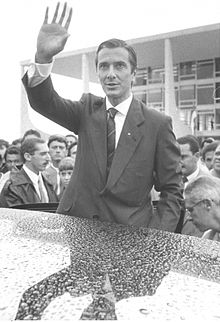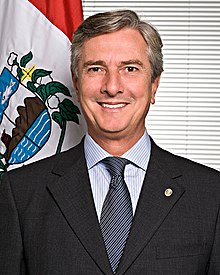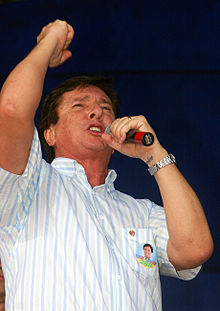Fernando Collor de Mello
He was later acquitted of ordinary criminal charges in his judicial trial before Brazil's Supreme Federal Court, for lack of valid evidence.In August 2017, Collor was accused by Brazil's Supreme Federal Court of receiving around US$9 million in bribes between 2010 and 2014 from Petrobras subsidiary BR Distributor.During his tenure as governor, he gained national attention for his purported efforts to challenge high salaries among public servants, whom he referred to as marajás (maharajas)[4] (likening them to the former princes of India who received a stipend from the government as compensation for relinquishing their lands).However, his stance on the issue significantly increased his popularity across the country, bolstered by appearances on nationally televised broadcasts—an unusual platform for a governor from a smaller state like Alagoas.[5] Although he gained national prominence as governor of Alagoas and positioned himself as an anti-corruption and anti-establishment candidate for the presidency, his career was marred by corruption scandals dating back to his tenure as mayor of Maceió.Earlier in his life, when he was a Federal Deputy in the National Congress, Collor was regarded as a relatively low-profile politician, primarily proposing legislation that appeared to favor his family's business interests.[6] In 1989 Collor defeated Luiz Inácio Lula da Silva in a controversial two-round presidential race with 35 million votes.[9] Historical Under Zélia's tenure as Brazil's Minister of Finances, the country had a period of major changes, featuring what ISTOÉ magazine called an "unprecedented revolution"[10] in many levels of public administration: "privatization, opening its market to free trade, encouraging industrial modernization, temporary control of the hyper-inflation and public debt reduction.The accusations weighed on the government and led Collor and his team to an institutional crisis leading to a loss of credibility that reached the finance minister, Zélia.[11] Some members of Collor's government were also part of the later Cardoso administration in different or similar functions: Luiz Carlos Bresser-Pereira, a minister in the previous Sarney and the following Fernando Henrique Cardoso administrations, stated that "Collor changed the political agenda in the country, because he implemented brave and very necessary reforms, and he pursued fiscal adjustments.Although other attempts had been made since 1987, it was during Collor's administration that old statist ideas were confronted and combated (...) by a brave agenda of economic reforms geared towards free trade and privatization.On 1 July 1992, a Joint Parliamentary Commission of Inquiry, composed of senators and members of the Chamber of Deputies, formed in Congress to investigate the accusation and review the evidence uncovered by police and federal prosecutors.Some weeks later, with the investigation progressing and under fire, Collor asked on national television for the people's support in going out in the street and protesting against "coup" forces.The report concluded that there was proof that Fernando Collor had had personal expenses paid for by money raised by Paulo Cesar Farias through his influence peddling scheme.Later, in the early hours of 30 December 1992, by the required two-thirds majority, the Senate found the former president guilty of the charges of impeachment.After the vote, the Senate issued a formal written opinion summarizing the conclusions and orders resulting from the judgement, as required by Brazilian law.The Senate's formal written sentence on the impeachment trial, containing its conviction of the former president and disqualification from public office for eight years, signed by the president of the Supreme Court and by the senators on 30 December 1992, was published in the Diário Oficial da União (the Brazilian Federal Government's official journal) on 31 December 1992.The Supreme Court had original jurisdiction under the Brazilian Constitution because Collor was one of the defendants and the charges mentioned crimes committed by a president while in office.The Federal Supreme Court threw out the corruption charges against him on a technicality,[23] citing a lack of evidence linking Collor to Farias' influence-peddling scheme.[24] Other pieces of evidence that were only gathered because of the information first extracted from files stored in Farias' computer were also voided, as the Collor defense successfully invoked the fruit of the poisonous tree doctrine before the Brazilian Supreme Court.[30] On 20 August 2015, Collor was charged by the Prosecutor General of Brazil with corruption, as a development of Operation Car Wash (Portuguese: Operação Lava Jato).









QuyllurPortuguese namefamily nameCollorHis ExcellencyPresident of BrazilVice PresidentJosé SarneyItamar FrancoSenatorAlagoasRenilde BulhõesRenan FilhoHeloísa HelenaChamber of DeputiesMaceióRio de JaneiroFederal DistrictBrazilRosane Brandão MaltaArnon de MeloAlma materUniversity of BrasíliaBrazilianpoliticianimpeachment trialBrazilian Senatefirst presidentBrazilian military dictatorshipcorruptionSupreme Federal CourtArnon Affonso de Farias MelloLindolfo CollorTV GloboGermanPetrobrasArnon Afonso de Farias MelloGerman immigrantsBrasíliaFederal University of AlagoasRosane MaltaCentro Sportivo AlagoanoNational Renewal Alliance PartyDemocratic Social PartyBrazilian Democratic Movement PartymaharajasPlanalto PalaceLuiz Inácio Lula da Silvacontroversial two-round presidential raceAbílio DinizinflationPlano CollorZélia Cardoso de Mellomoney supplyhyper-inflationLiberalism in BrazilClassical liberalismNeoliberalismLiberal conservatismLibertarianismParliamentarianismSocial liberalismThird WayAbolitionismDemocracyEqualityFederalismFree tradeFreedomInstitutionalismLocalismConstitutionalist RevolutionCoup of the RepublicDiretas JáPernambucan revoltRevolution of 1830CamposCarlos de AndradeHipólito da CostaGuidinFrancoMeira PennaMerquiorNabucoSimonsenViscount of CairuAlckminAmoêdoBarbosaGuimarãesKubitschekNeves (Aécio)Neves (Tancredo)Viscount of MauáBrazilian Democratic MovementBrazilian Social Democracy PartyBrazil UnionCitizenshipLiberal Party (2006)New PartySocial Democratic (2011)DemocratsLiberator PartyLiberal (1985)Liberal AllianceProgressive LeagueSocial Democratic (1945)Social Liberal PartyLIVRESFolha de S.PauloCorreio BrazilienseFree Brazil MovementISTOÉinfluence peddlingMarcílio Marques Moreiranational debtPlano Realprivatizationrunning mateFernando Henrique CardosoLula da SilvaAcesitaEmbraerTelebrásCompanhia Vale do Rio DocePedro Malan
